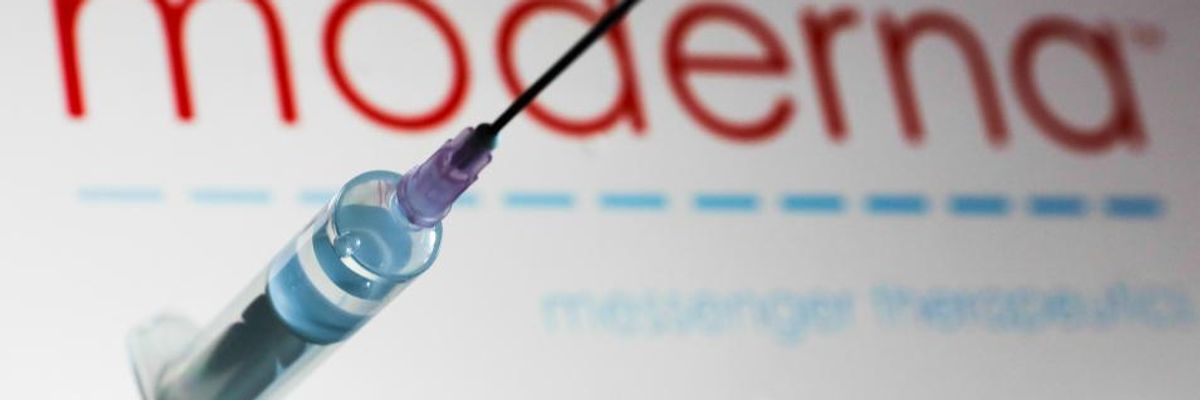With Moderna already under fire globally for prioritizing the vaccination demands of rich countries in the ongoing fight against Covid-19, the chairman and co-founder reiterated Monday that the American company will not share its vaccine recipe.
In an interview with The Associated Press, Moderna's Noubar Afeyan claimed that appeals from the World Health Organization (WHO) and others to share the recipe assumed "that we couldn't get enough capacity, but in fact we know we can."
"Within the next six to nine months, the most reliable way to make high-quality vaccines and in an efficient way is going to be if we make them," Afeyan said, noting that Moderna "went from having zero production to having one billion doses in less than a year" and "we think we will be able to go from one to three billion" next year.
"We think we are doing everything we can to help this pandemic," added Afeyan, who is among the Moderna founders who were named to Forbes' list of the 400 richest people in the United States for the first time last week.
Afeyan also said Moderna--which has received billions of dollars from the U.S. government for development and doses of its messenger RNA (mRNA) vaccine--will continue to not enforce patent infringement during the pandemic, adding that "we didn't have to do that."
"We think that was the right, responsible thing to do," he said of the decision to not legally go after others making Covid-19 vaccines during the crisis. "We want that to be helping the world."
Critics of Moderna and other vaccine makers have argued that Big Pharma can help battle the pandemic by supporting patent waivers and widely sharing necessary information about vaccines and treatments to rapidly scale up production.
Last week, Moderna announced it "will build a state-of-the-art mRNA facility in Africa with the goal of producing up to 500 million doses of vaccines each year."
As Common Dreams reported, critics warned the move could be nothing more than a "PR gimmick" designed to stall or totally derail discussions about a patent waiver for Covid-19 vaccines and "divert focus" from the WHO's mRNA technology transfer initiative in South Africa.
Moderna also faced criticism after The New York Timesreported Saturday that the company "has been supplying its shots almost exclusively to wealthy nations, keeping poorer countries waiting and earning billions in profit."
After noting that "Moderna has shipped a greater share of its doses to wealthy countries than any other vaccine manufacturer, according to Airfinity, a data firm that tracks vaccine shipments," the newspaper provided context about various companies:
About one million doses of Moderna's vaccine have gone to countries that the World Bank classifies as low income. By contrast, 8.4 million Pfizer doses and about 25 million single-shot Johnson & Johnson doses have gone to those countries.
Of the handful of middle-income countries that have reached deals to buy Moderna's shots, most have not yet received any doses, and at least three have had to pay more than the United States or European Union did, according to government officials in those countries...
Unlike Pfizer, Johnson & Johnson, and AstraZeneca, which have diverse rosters of drugs and other products, Moderna sells only the Covid vaccine. The Massachusetts company's future hinges on the commercial success of its vaccine.
Afeyan, in his interview with the AP, pushed back, saying that Moderna supplied a "quite significant" output to poorer nations and is currently working with multiple governments "to help them secure supplies for the express purpose of supplying to low-income countries."
Dr. Tom Frieden, a former head of the U.S. Centers for Disease Control and Prevention, told the Times Moderna is "behaving as if they have absolutely no responsibility beyond maximizing the return on investment."

